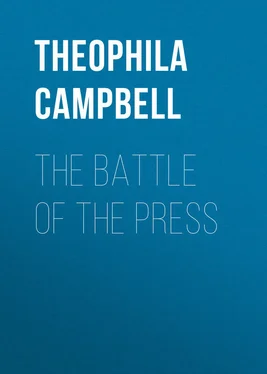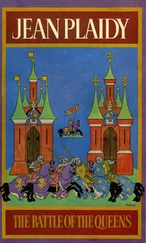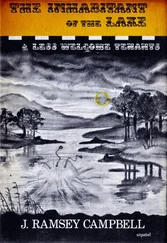Theophila Campbell - The Battle of The Press
Здесь есть возможность читать онлайн «Theophila Campbell - The Battle of The Press» — ознакомительный отрывок электронной книги совершенно бесплатно, а после прочтения отрывка купить полную версию. В некоторых случаях можно слушать аудио, скачать через торрент в формате fb2 и присутствует краткое содержание. ISBN: , Жанр: foreign_antique, foreign_prose, Историческая проза, на английском языке. Описание произведения, (предисловие) а так же отзывы посетителей доступны на портале библиотеки ЛибКат.
- Название:The Battle of The Press
- Автор:
- Жанр:
- Год:неизвестен
- ISBN:http://www.gutenberg.org/ebooks/38370
- Рейтинг книги:4 / 5. Голосов: 1
-
Избранное:Добавить в избранное
- Отзывы:
-
Ваша оценка:
- 80
- 1
- 2
- 3
- 4
- 5
The Battle of The Press: краткое содержание, описание и аннотация
Предлагаем к чтению аннотацию, описание, краткое содержание или предисловие (зависит от того, что написал сам автор книги «The Battle of The Press»). Если вы не нашли необходимую информацию о книге — напишите в комментариях, мы постараемся отыскать её.
The Battle of The Press — читать онлайн ознакомительный отрывок
Ниже представлен текст книги, разбитый по страницам. Система сохранения места последней прочитанной страницы, позволяет с удобством читать онлайн бесплатно книгу «The Battle of The Press», без необходимости каждый раз заново искать на чём Вы остановились. Поставьте закладку, и сможете в любой момент перейти на страницу, на которой закончили чтение.
Интервал:
Закладка:
The Battle of The Press / As Told in the Story of the Life of Richard Carlile by His Daughter, Theophila Carlile Campbell
PREFACE
In presenting to the present generation of England and America the comprehensive though necessarily condensed history of the life and work of the great pioneer in the cause of mental freedom, I am actuated by two principal motives, the foremost of which is the desirable duty of presenting to the people of to-day a faithful account of the work done by Carlile and the enormous sacrifices he made, as well as the terrible imprisonments he endured in the accomplishment of the task he set himself to do, namely, to establish for his countrymen a really Free Press, and the right of free oral discussion, as, up to his time, neither right had ever been accorded to any of the peoples of Europe by either Church or State.
In the prosecution of his self-appointed task he was assailed by the reigning powers with all the malignity and religious fury that characterised the days of the Inquisition. No lie was too black to be hurled at him, no motive too low to be imputed to him, the minds of his countrymen were purposely influenced against him in order that they might not understand his real object – that of benefiting them – and to divert attention from his enemies' misdoing. So he was given the horns, hoofs, and tail of Satan himself, and invested with all the attributes of this fallen angel. It is not to be wondered at that the majority of the people at that time were so influenced, when we consider the very limited resources of the times in regard to information. Almost all of this was carried and given by word of mouth, and it was naturally colored by the views or feelings of those who gave it out.
To rescue the name of a true friend of the people from the undeserved obloquy or silence under which it has been so long obscured, and to place his memory and name where it truly belongs in the list of the honored dead of his country, and in the hearts of his countrymen, there to dwell as long as English history lasts, is the second motive. In doing this we may turn upon all the evidences, both public and private, the modern searchlight of critical investigation, and I am satisfied that when the clouds of malignant abuse and the mass of unsubstantiated charges that were heaped upon his name and fame by those who were interested in doing so are cleared away, his name and the record of his life will stand out from the past as a star of the first magnitude stands out from the darkened sky of night – bright, clear, and pure.
I therefore, with confidence, commit the record of Carlile, as a man with the highest aims, unselfish purpose, and finest motives, who gave the efforts of a noble life and high moral purpose for the advancement of truth and the benefit of his fellow-men, to an enlightened and unbiassed generation, not doubting that it will recognise the true merit of the man and appreciate the value of his accomplishments for the benefit not only of his countrymen but of the world at large.
THEOPHILA CARLILE CAMPBELL.
PART I.
THE BATTLE OF THE PRESS, AS TOLD IN THE LIFE OF RICHARD CARLILE
CHAPTER I. INTRODUCTORY
"Yet shall remembrance from oblivion's veil,
Relieve your scene and sigh with grief sincere,
And soft compassion at your tragic tale,
In silent tribute pay her kindred tear."
We who rejoice in a Free Press to-day can hardly realise the condition of the Press in Europe at the opening of the nineteenth century. In England, eighty years ago, he who dared to express opinions in opposition to the Established Church, or in any way offensive to the government of the day, rendered himself liable to heavy fines and severe imprisonment. The following extract will show better, perhaps, than anything else what a deplorable state the Press was in when Richard Carlile entered upon his great fight, and the obstacles he had to encounter: —
"It is difficult to imagine a more degraded and dangerous position than that in which every political writer was placed in the year 1817. In the first place, he was subject by a Secretary of State's warrant to be imprisoned upon suspicion under the suspension of the Habeas Corpus Act. Secondly he was open to an ex-officio information under which he would be compelled to find bail or be imprisoned. The power of ex-officio information had been extended so as to compel bail by an Act of 1808; but from 1808 to 1811, during which three years forty such informations were laid, only one person was held to bail." 1 1 Larned's "Encyclopaedia and Topical History".
This was the time and this the state of affairs which greeted Carlile when he first entered into public life. He did not then see a man who had the courage to stand up boldly against such formidable odds. He, therefore, resolved to raise the standard of an absolutely Free Press, and be himself the bearer of the colors. This he knew involved possibilities of imprisonment, of exile, losses and suffering. He believed that his example would rally the weak and scattered forces of the writers of the day, and rouse the people to a sense of their degradation and dangerous condition, and to a recognition of the oppressive character of the rulers then in power.
In gathering materials for the life of Richard Carlile, I have drawn freely from his own publications, and also from a mass of correspondence extending over many years of his life. These letters were in most cases strictly private, yet every one of them would bear publication as far as Carlile is concerned. He, however, was the recipient of many confidences on the part of his friends – their sorrows were always his by sympathy. The claims of friendship, long since past, still hold good, though he would profit and not lose by the publication of the whole correspondence.
Chief amongst his publications were the fourteen volumes of the Republican , a weekly paper of thirty-two pages, ten or more volumes of which were edited in Dorchester Gaol. The very name of Republican in those days was a challenge to combat. This publication was the direct outcome of the Manchester massacre. The name had once before been adopted, but was withdrawn by Mr. Sherwin, the proprietor, as too dangerous.
After the rash and brutal conduct of the Government at Peter's Fields – or "Peterloo", as it came to be called – Carlile took up the paper, restored the name Republican , and, raising the war-cry of "a Free Press", kept it up through five of his six years of imprisonment in Dorchester Gaol and for one year after.
The horrors of the French Revolution, and the declaration of independence of the Colonial States of America, were yet too fresh in memory for the authorities of the time to see without alarm what seemed to be the flag of Republicanism flaunted in their very faces, and they sought to put it down at all hazards. The story of the battle between the authorities and Carlile will be found in the story of his life. It lasted for many years, but Carlile lived to come off a victor. The Government finally declared themselves defeated by him in his mode of moral warfare in the struggle for the freedom of the Press, pronouncing him invincible in the course he had taken.
It was said of the Republican that the only section of the British Press which could be said to be free at that time, was that which was issued from Dorchester Prison!
Before his six years of imprisonment had expired, Carlile was informed that it was Lord Castlereagh, the then Prime Minister, who was so determined to crush him, and also that it was his publication of the horrors of the Manchester massacre and his open letters to the King and Lord Sidmouth that gave the offence – Castlereagh himself having given the order for the massacre, and being solely responsible for it.
Читать дальшеИнтервал:
Закладка:
Похожие книги на «The Battle of The Press»
Представляем Вашему вниманию похожие книги на «The Battle of The Press» списком для выбора. Мы отобрали схожую по названию и смыслу литературу в надежде предоставить читателям больше вариантов отыскать новые, интересные, ещё непрочитанные произведения.
Обсуждение, отзывы о книге «The Battle of The Press» и просто собственные мнения читателей. Оставьте ваши комментарии, напишите, что Вы думаете о произведении, его смысле или главных героях. Укажите что конкретно понравилось, а что нет, и почему Вы так считаете.












